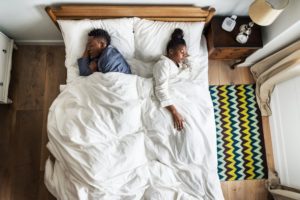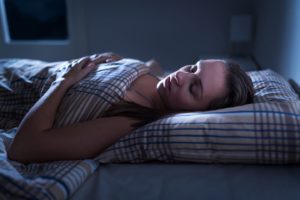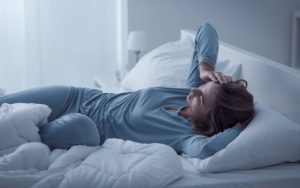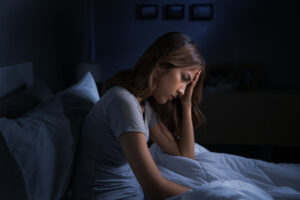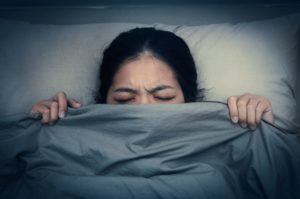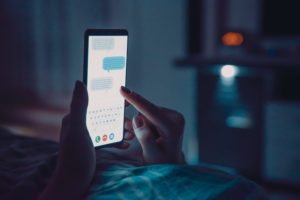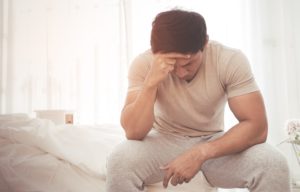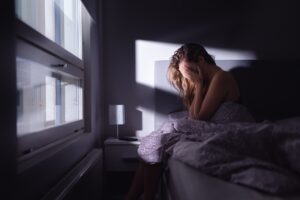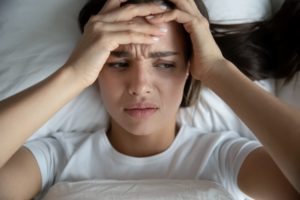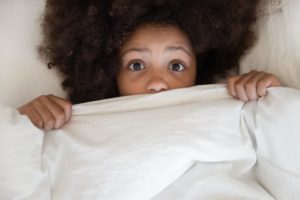When you buy through our links, we may earn a commission. Products or services may be offered by an affiliated entity. Learn more.
Hypnic Jerks: Why You Twitch In Your Sleep
- Hypnic jerks are involuntary muscle movements as you fall asleep.
- Twitches are painless but can trigger a startling reaction.
- Caffeine, exercise, and stress can increase your risk.
Hypnic jerks — also called sleep starts — are sudden, involuntary muscle contractions you may experience as you are falling asleep. Hypnic is short for hypnagogic, a word that describes the transition between wakefulness to sleep, which is when these jerks occur. Hypnic jerks happen seemingly at random as you are falling asleep, and typically only affect one side of the body, such as your left arm and left leg.
Is Your Sleep a Problem?
Hypnic jerks themselves are not a cause for concern, but sleep disruptions like this can be indicative of other sleep related issues. Answer three questions to understand if you should be concerned.
Why Does My Body Twitch at Random Times at Night?
Researchers do not know for certain what causes hypnic jerks, but there are some theories. Hypnic jerks and other types of myoclonus start in the same part of your brain that controls your startle response. When you fall asleep, it is suspected that a misfire sometimes occurs between nerves in the reticular brainstem, creating a reaction that leads to a hypnic jerk.
For example, it may be that when your muscles relax completely, even though this is a normal part of falling asleep, your brain mistakenly assumes you are really falling and reacts by twitching your muscles. It may also be possible that hypnic jerks are a physical reaction to the dream-like imagery that accompanies them.
Certain risk factors may increase your likelihood of experiencing a hypnic jerk, including excessive caffeine and stimulant consumption, vigorous exercise before sleep, emotional stress, and sleep deprivation.
Excessive Caffeine or Nicotine Consumption
Stimulants like caffeine and nicotine wake up your brain. These substances can also stay in your system for several hours, disrupting sleep. In one study, people who stopped drinking coffee six hours before bed still had trouble falling asleep. Having too much caffeine or nicotine, or consuming these substances too close to bedtime, may lead to hypnic jerks.
Vigorous Exercise at Night
In general, exercise is almost always beneficial when it comes to sleep. Regular exercise has been consistently demonstrated to improve sleep quality . However, it is important to recognize that exercise is an energizing activity that makes you feel more alert, rather than tired. For that reason, exercising too vigorously late in the evening may lead to hypnic jerks.
Sleep Deprivation
Trouble sleeping and lack of regular sleep overall, whether due to chronic insomnia or a poor night’s sleep, can both lead to sleep deprivation. Among other unwanted side effects, like poor mood and focus, sleep deprivation may increase your risk of hypnic jerks.
Stress and Anxiety
Both everyday stress and diagnosed anxiety disorders can contribute to insomnia, which leads to the kind of sleep deprivation that increases your risk of hypnic jerks. When you are stressed or anxious, your cortisol levels remain elevated during sleep, which makes sleep less restful. Anxious thoughts can also keep you up at night, making it hard for you to relax into sleep and disrupting the transition between wakefulness and sleep, potentially triggering a hypnic jerk.
Some people who experience hypnic jerks frequently may even develop anxiety around sleep itself, which only increases their likelihood of experiencing sleep deprivation and more hypnic jerks. Many people find that sleeping with a weighted blanket can help alleviate nighttime anxiety. Bearaby is a favorite of ours (and many others, with thousands of five-star reviews to prove it) thanks to their durability, bright color options, and chunky knits.
What Do Hypnic Jerks Feel Like?
Hypnic jerks are a type of myoclonus , which is a category of rapid, involuntary muscle movements, such as jerking or twitching. You may experience a single jerk, or multiple in succession, before your body relaxes again. In addition to these movements, it is common to experience other sensations or mental imagery along with a hypnic jerk, such as a dream or hallucination. People often report feeling like they are falling, seeing flashing or blinding lights , or hearing banging, crackling, or snapping sounds. For the most part, hypnic jerks are painless, although some people do report a tingling or painful sensation.
Hypnic jerks can feel different at various times. They can be strong enough to jolt a person awake and disrupt the process of falling asleep. Other times, they may be so mild that the affected person does not notice them at all — although their sleep partner might.
Hypnic jerks occur at any age, but are more common among adults. In part, this may be due to the fact that some of their potential causes, such as caffeine consumption and elevated stress levels, are also more common in adulthood.

Are Hypnic Jerks Normal? Should I be Concerned?
Hypnic jerks can be unsettling, but they are not dangerous. Up to 70% of people experience hypnic jerks.
Hypnic jerks can be annoying and disrupt the sleep of you or your partner, but that is typically the extent of their negative effects. While it is possible that a particularly violent jerk could lead to a minor injury, this is not common.
When to See a Doctor About Hypnic Jerks
Hypnic jerks are different from other movements that can occur while you are awake or sleeping. Hypnic jerks occur during the transition from wakefulness into sleep, happen quickly, and are generally considered harmless. If you only experience hypnic jerks, you probably do not need to see a doctor.
However, some symptoms similar to hypnic jerks may require medical attention. If, during the daytime, you experience multiple, persistent contractions in your muscles that spread to other parts of your body, you could be experiencing a different type of myoclonus, rather than a hypnic jerk. These types of myoclonus can be indicators of other medical conditions. If you experience other types of jerking movements during sleep beyond hypnic jerks as you fall asleep, they could be symptoms of periodic limb movement disorder. If you are concerned your muscle jerks are a symptom of another issue, speak to your doctor.
How To Stop Hypnic Jerks
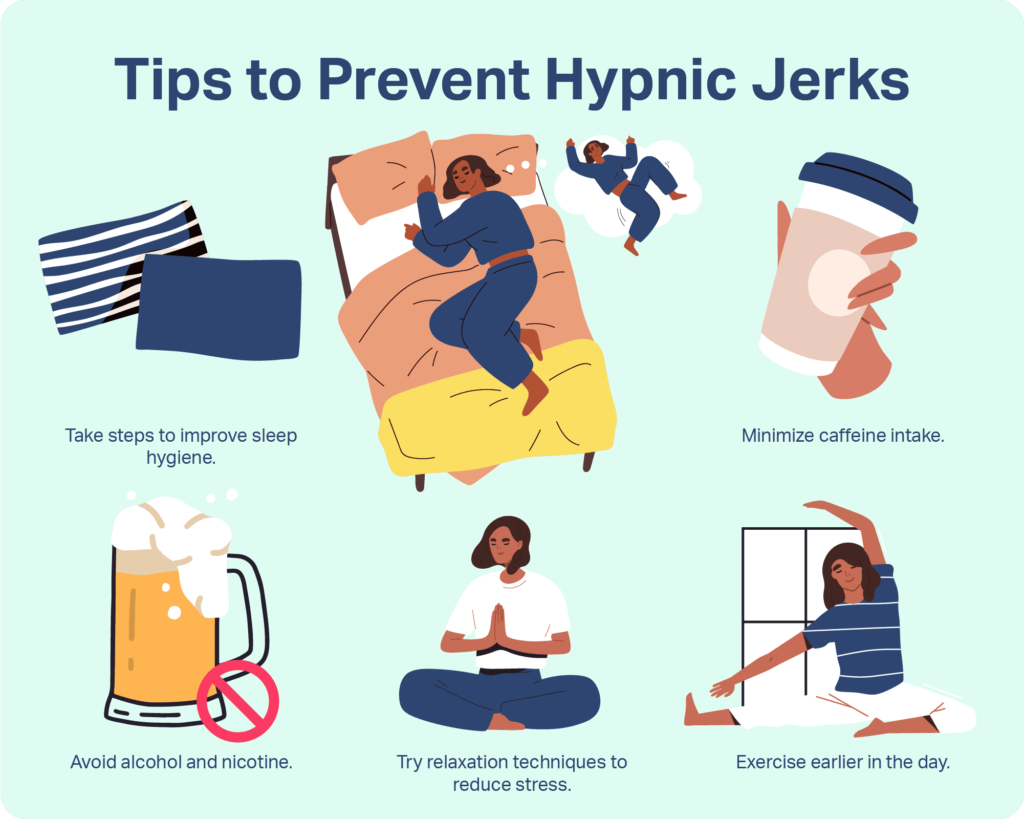
Hypnic jerks are a normal, albeit unpredictable, part of the experience of falling asleep. It is unlikely that you will be able to completely eradicate them from your life. However, you can reduce their frequency and intensity, and improve your sleep at the same time, with a few simple techniques.
Adopt Better Sleep Habits
Improving your sleep hygiene can make it easier for you to sleep better more consistently, which may reduce the occurrence of hypnic jerks. Common practices include:
- Going to bed and waking up at the same time every day, even on weekends
- Setting your bedroom temperature to around 65 to 68 degrees Fahrenheit
- Making your bedroom as dark and quiet as possible, using blackout curtains or a white noise machine if needed
- Stopping the use of electronics at least one hour before bed
- Following a nightly bedtime routine
Reduce Your Stress
Reducing stress could lead to a reduction in hypnic jerks. Explore relaxation techniques that can relieve your stress. Meditation, deep breathing, and yoga, can all help. Fill your bedtime routine with calming activities, like a warm bath or reading a book. If your stress and thoughts interfere with your quality of life, speak to a doctor or therapist.
Exercise Daily
Exercise daily to enjoy more restful sleep. Regular exercise can also help relieve stress . If you prefer a vigorous workout , schedule your exercise for earlier in the day to prevent sleep disruptions. If you can only exercise at night, opt for low- or moderate-intensity exercises like walking or yoga. Aim to finish your workout at least 90 minutes before bed to allow your heart rate to slow back down and prevent the occurrence of hypnic jerks.
Minimize Your Caffeine Consumption
Caffeine can provide some beneficial energy-boosting effects during the daytime, but consuming too much, especially later in the day, can interfere with your ability to sleep soundly. If you are experiencing hypnic jerks and having trouble sleeping as a result, caffeine could be the culprit. Avoid consuming more than 400 milligrams per day, and schedule your last cup of coffee for at least eight hours before bedtime.
Avoid Nicotine and Alcohol
Nicotine is a stimulant that can impair your brain’s ability to wind down at night. It can also impact your sleep quality once you are asleep. Although alcohol is a sedative, it can also disrupt your sleep architecture , leading to the sleep deprivation that increases your risk for hypnic jerks.
Be aware that even after implementing these tips, you may still experience hypnic jerks on occasion. They are considered a normal part of falling asleep. If you experience other movements that are disrupting your sleep, however, consult your doctor.

Still have questions? Ask our community!
Join our Sleep Care Community — a trusted hub of sleep health professionals, product specialists, and people just like you. Whether you need expert sleep advice for your insomnia or you’re searching for the perfect mattress, we’ve got you covered. Get personalized guidance from the experts who know sleep best.
References
9 Sources
-
Drake, C., Roehrs, T., Shambroom, J., & Roth, T. (2013). Caffeine effects on sleep taken 0, 3, or 6 hours before going to bed. Journal of Clinical Sleep Medicine, 9(11), 1195–1200.
https://pubmed.ncbi.nlm.nih.gov/24235903/ -
Dolezal, B. A., Neufeld, E. V., Boland, D. M., Martin, J. L., & Cooper, C. B. (2017). Interrelationship between sleep and exercise: A systematic review. Advances in Preventive Medicine, 2017,
https://pubmed.ncbi.nlm.nih.gov/28458924/ -
Basta, M., Chrousos, G. P., Vela-Bueno, A., & Vgontzas, A. N. (2007). CHRONIC INSOMNIA AND STRESS SYSTEM. Sleep medicine clinics, 2(2), 279–291.
https://pubmed.ncbi.nlm.nih.gov/18071579/ -
Staner, L. (2003). Sleep and anxiety disorders. Dialogues in Clinical Neuroscience, 5(3), 249–258.
https://pubmed.ncbi.nlm.nih.gov/22033804/ -
Ibrahim, W., Zafar, N., & Sharma, S. (2022, August). Myoclonus. In StatPearls. StatPearls Publishing.
https://www.ncbi.nlm.nih.gov/books/NBK537015/ -
Sathe, H., Karia, S., Desousa, A., & Shah, N. (2015). Hypnic jerks possibly induced by escitalopram. Journal of Neurosciences in Rural Practice, 6(3), 423–424.
https://pubmed.ncbi.nlm.nih.gov/26167034/ -
Childs, E., & de Wit, H. (2014). Regular exercise is associated with emotional resilience to acute stress in healthy adults. Frontiers in Physiology, 5, 161.
https://pubmed.ncbi.nlm.nih.gov/24822048/ -
Myllymäki, T., Kyröläinen, H., Savolainen, K., Hokka, L., Jakonen, R., Juuti, T., Martinmäki, K., Kaartinen, J., Kinnunen, M. L., & Rusko, H. (2011). Effects of vigorous late-night exercise on sleep quality and cardiac autonomic activity. Journal of Sleep Research, 20(1 Pt 2), 146–153.
https://pubmed.ncbi.nlm.nih.gov/20673290/ -
Stein, M. D., & Friedmann, P. D. (2006). Disturbed sleep and its relationship to alcohol use. Substance Abuse, 26(1), 1–13.
https://pubmed.ncbi.nlm.nih.gov/16492658/


